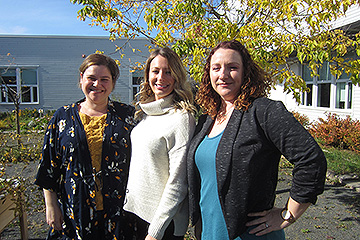News
Help for Problem Gaming

From Left to Right: Ember Schincariol,
Karlee Gutmann and Erin Dietrich,
counsellors at the Gambling & Behavioural
Addictions program at Sister Margaret Smith Centre
Date: 2019-11-25
Local counsellors provide support for problem gaming, gambling, shopping and more
The last week of November is National Addiction Awareness Week. Behavioural addictions - like problem gaming, gambling, shopping, internet use or social media use - may not be as well-known as alcohol or drug addiction, but they can have a profound impact on a person’s health and quality of life. “It’s a behavior that people are using to an unhealthy degree that helps them cope with emotions or trauma,” says Erin Dietrich, a Registered Psychotherapist with the Gambling & Behavioural Addictions Program at St. Joseph’s Care Group’s (SJCG) Sister Margaret Smith Centre (SMSC). “If you don’t have healthy ways of dealing with difficult emotions, which can be triggered by boredom or isolation or loneliness, you lean on things that have helped you in the past by distracting you,” she says.
Problem gaming is a relatively newer behavioral addiction, where someone is overusing a video game or app to the extent that it affects their relationships, health, school or job - and it’s one that counsellors at SMSC can help with through free, confidential in-person meetings.
Who is more susceptible?
At SMSC, children, youth and young adults are the main clients, although research suggests that a typical problem gamer is a 35-year-old male. “Often it’s a parent or caregiver that’s contacting us because they are recognizing it as a problem, not necessarily that the child or youth is saying ‘I have a problem,’” says Ember Schincariol, an Addictions Counsellor and Registered Social Worker at SMSC. Many of the program’s clients are kids with attention deficit hyperactivity disorder (ADHD), kids who are on the autism spectrum or kids who have learning disabilities, and they are more likely to be boys than girls. “School difficulties or bullying is a common theme too,” notes Karlee Gutmann, a Registered Social Services Worker and intake counsellor at SMSC.
What are signs of problem gaming?
Schincariol says that parents notice that the young person is spending huge amounts of time gaming, their grades are going down and they’re not eating properly. Gutmann points to some other signs: “Are they falling away from things they used to enjoy? Maybe they’re not hanging out with friends or teams they used to be involved with. Sometimes it’s just irritability, and wanting to be alone. If parents try to take the game away or limit their wi-fi time there’s anger, frustration, or acting-out behaviours. Parents might notice an increase in kids asking for money so they can buy extras in the games they’re playing.”
How do you see a counsellor? What happens at appointments?
A referral isn’t required - you can simply call SMSC at (807) 684-5100 and ask to make an appointment with a behavioural addiction counsellor. The counselling is free and it only takes about a week or two to get in to see a counsellor, who you then meet, often biweekly or monthly, to talk about triggers and practice healthier coping strategies.
At your first appointment, the intake counsellor gathers information about how the gaming is affecting the person, and what their goals are. “Often times, the parents are at a place where they’re saying, ‘they don’t necessarily have to quit, we just want to reduce the harm that this is causing.’ We can work with the parent and the kid on how we can make gaming more safe and enjoyable, which is what it is supposed to be,” says Dietrich. “It’s important for people to know that services are voluntary,” says Schincariol. “If their child is adamant they don’t want to come in, you can’t force that child to come in, but at the same time we can offer services to the parent and work with them until maybe they get to a place where the child changes their mind.”
Dawn* noticed that her 12-year-old son Alexander* was using his phone and computer games as a way of coping with stresses at home, and she made an appointment for him to talk with Gutmann. “I was so relieved that my son was open to speaking with Karlee,” she says. “My son now asks me to make appointments, and he’s aware of his triggers.” Alexander says that Gutmann helped him figure out that physical activity, rather than gaming, assists him when he’s feeling upset. “I feel way better than before,” he says.
Gutmann and Schincariol also do popular workshops with grade 4, 5 and 6 students at both the public and separate school boards to talk about what problem gaming is and how to recognize when digital activities are out of balance. It works to both educate the kids, and provide friendly faces if a caregiver or parent does make a counselling appointment.
A key point to remember: “You direct your own care. We want people to know that they have power when they come here,” says Dietrich. “Their goals are what’s important, and we work with the client to get what they want for themselves.”
CTA: Contact Sister Margaret Smith Centre at (807) 684-5100 ext. 5015 to find out more about counselling for problem gaming and other behavioural addictions.
*names have been changed to protect privacy
